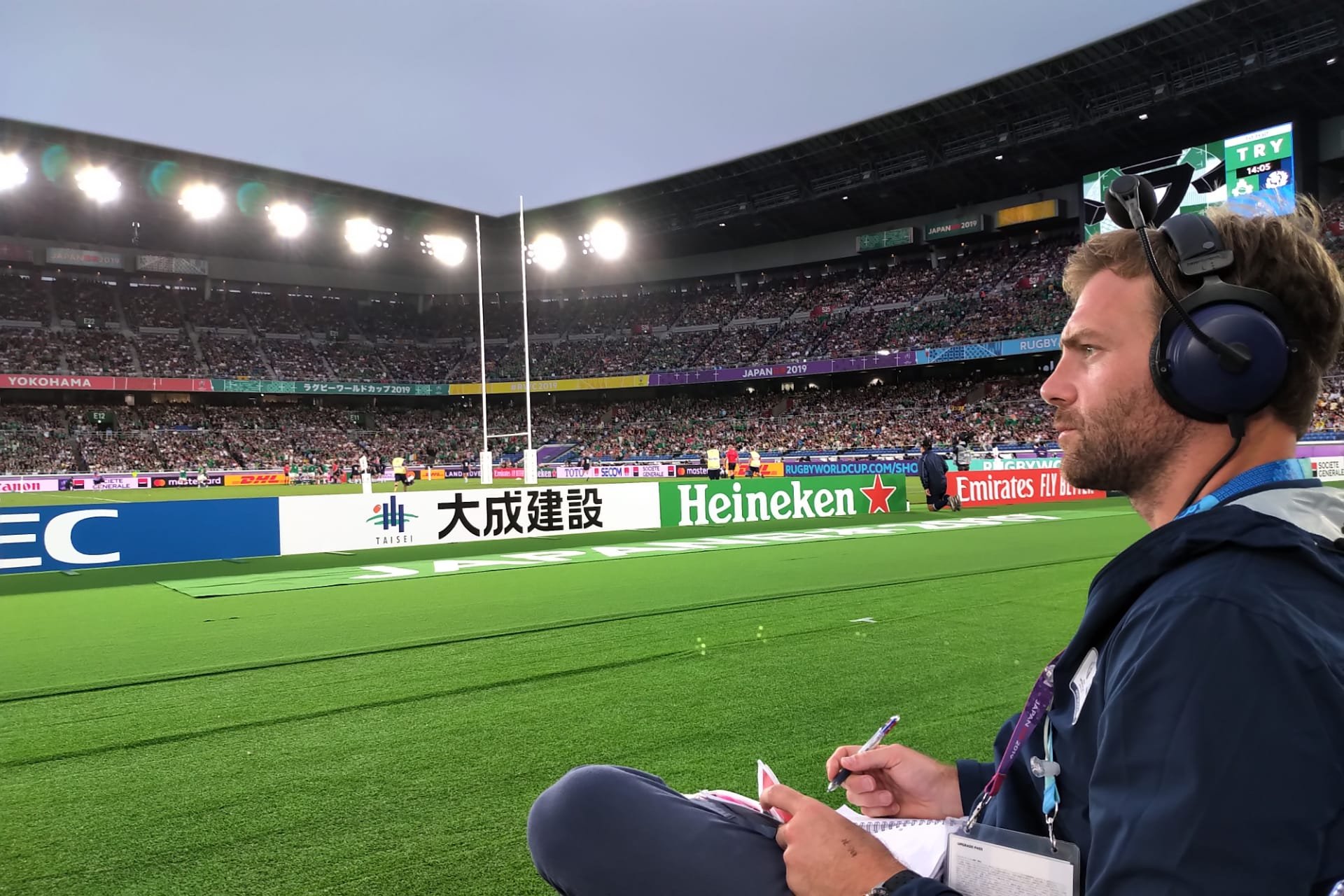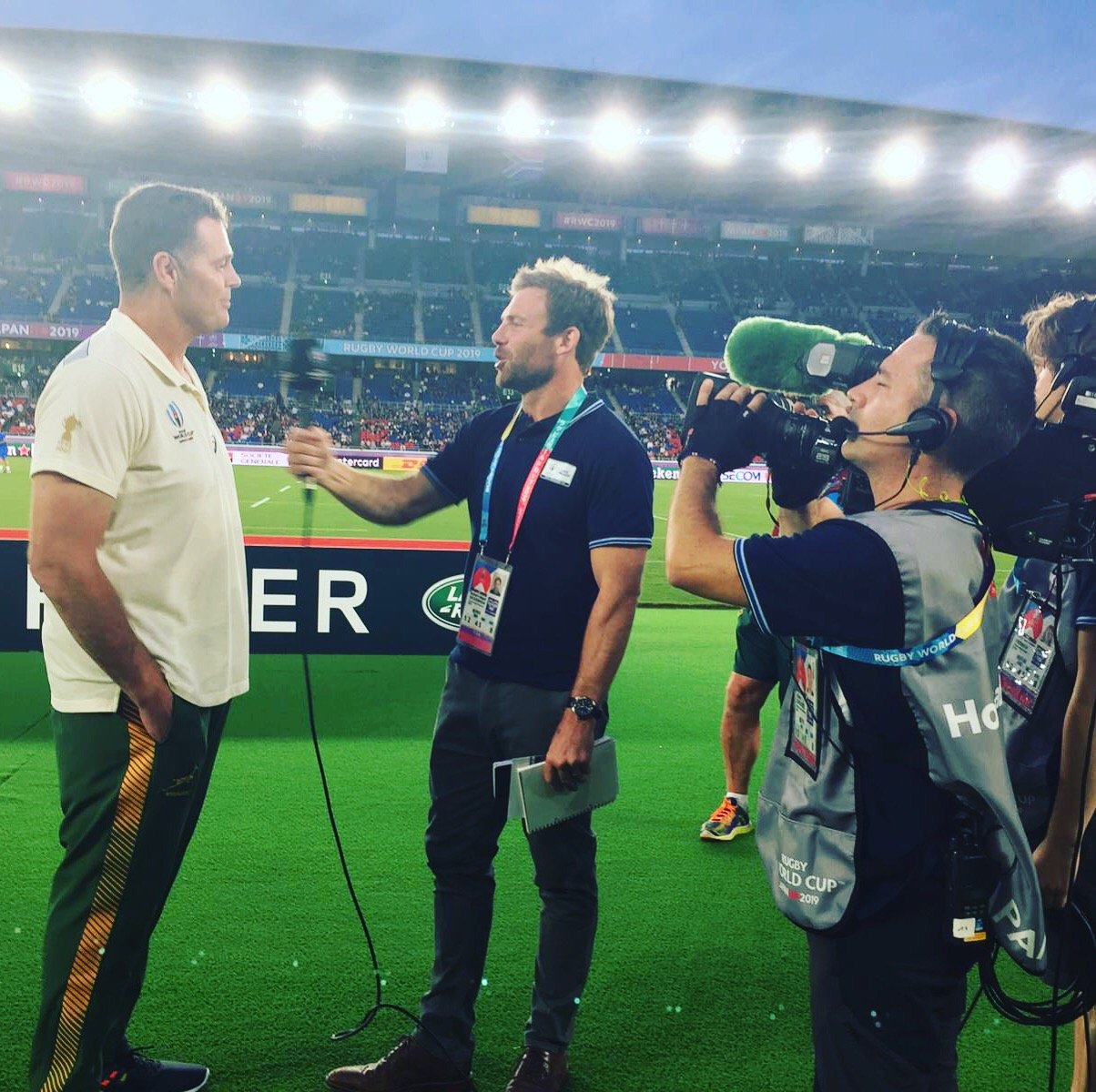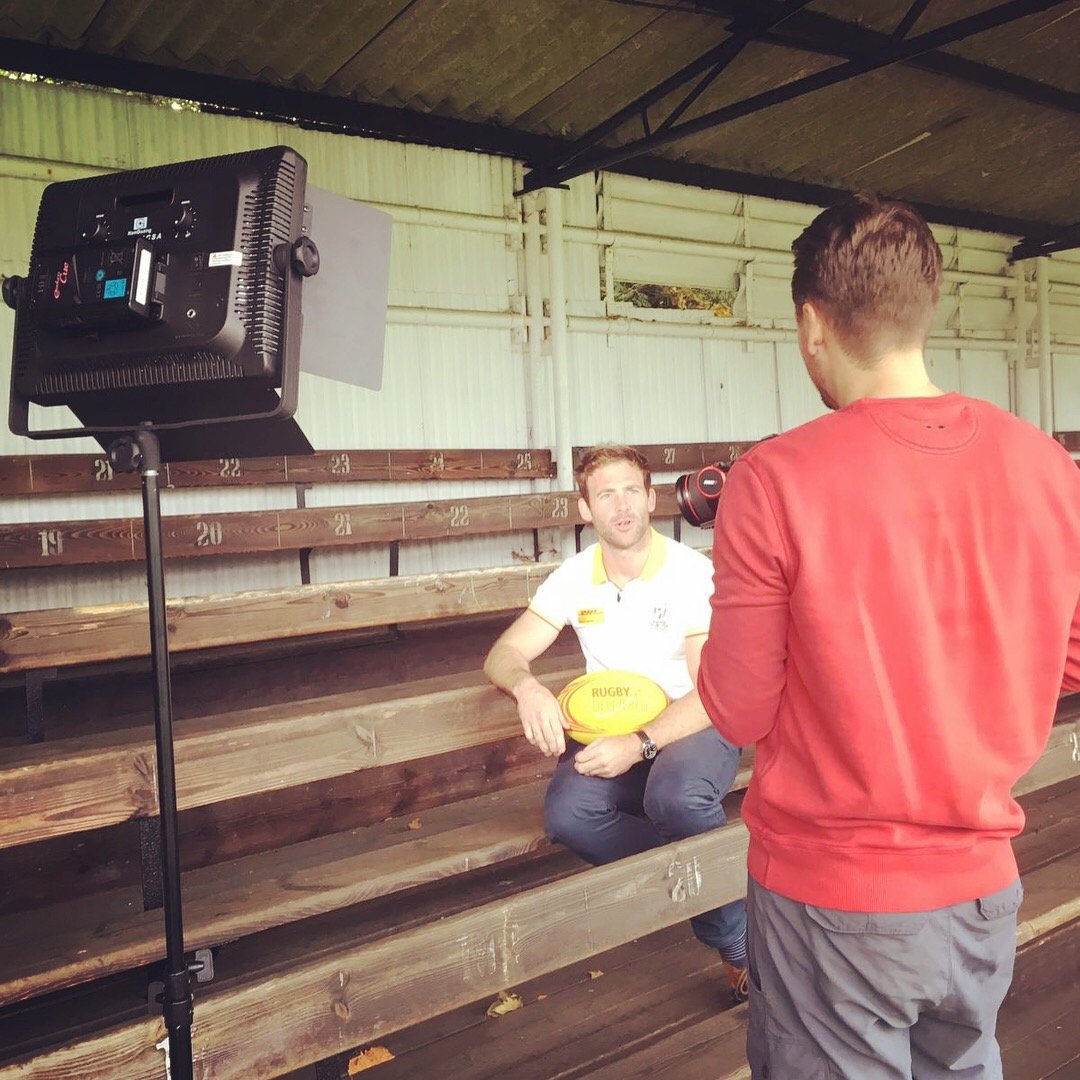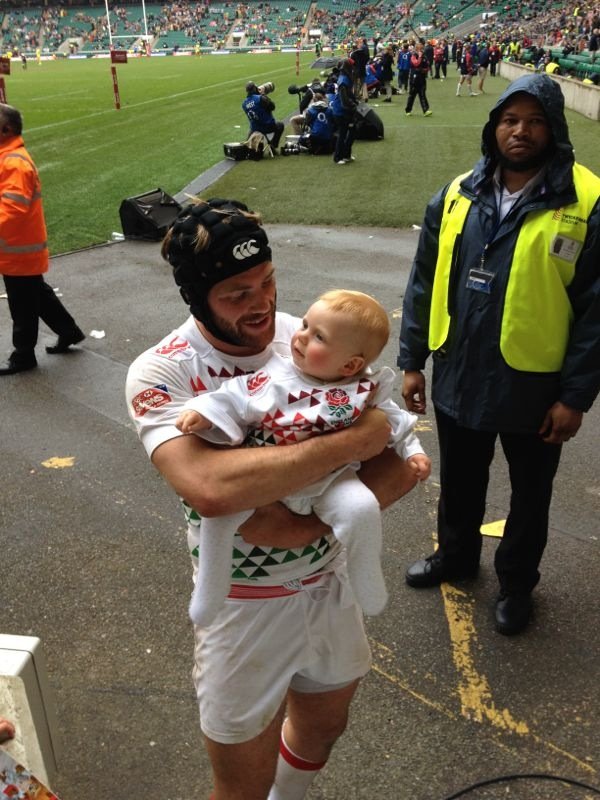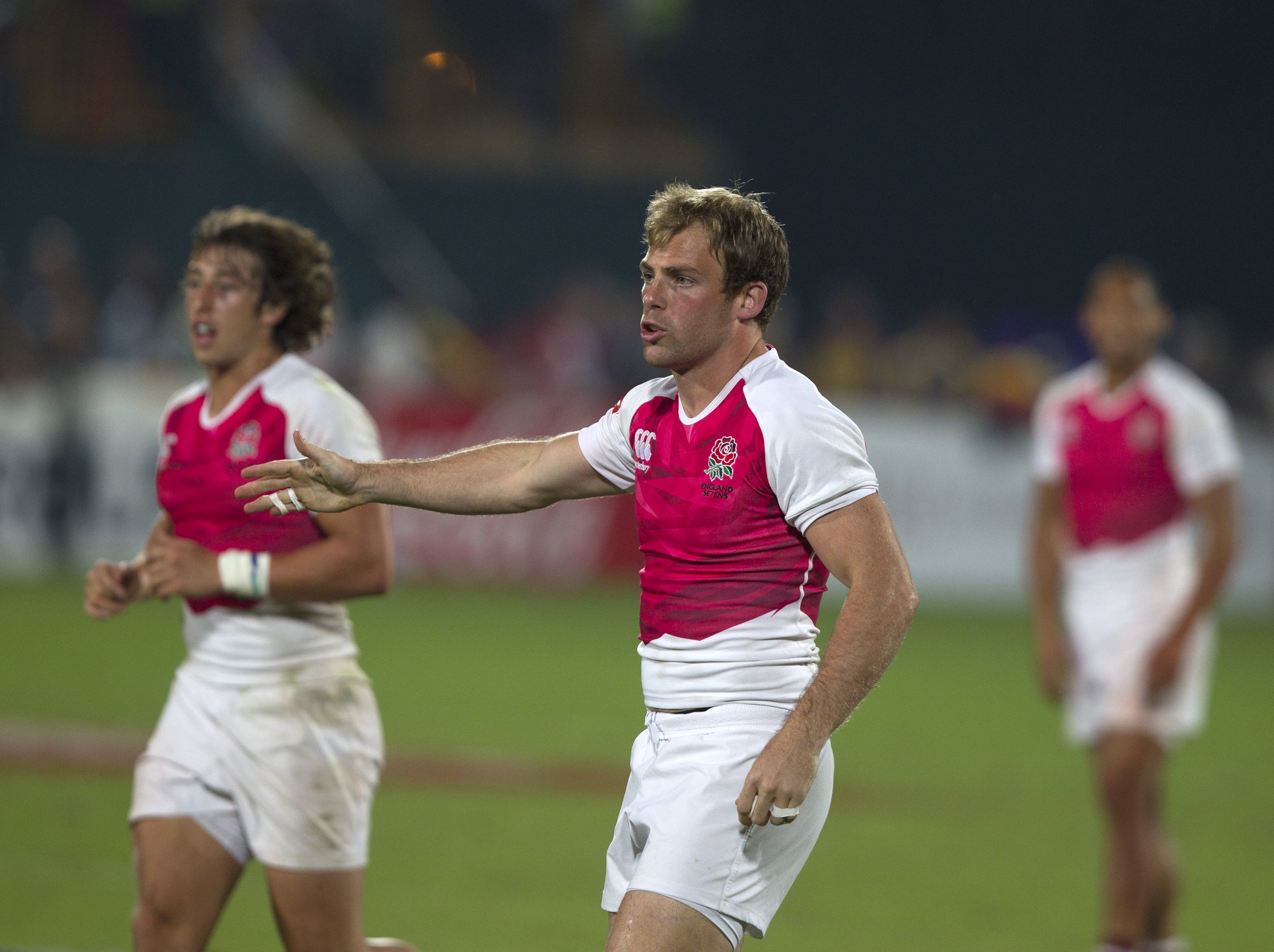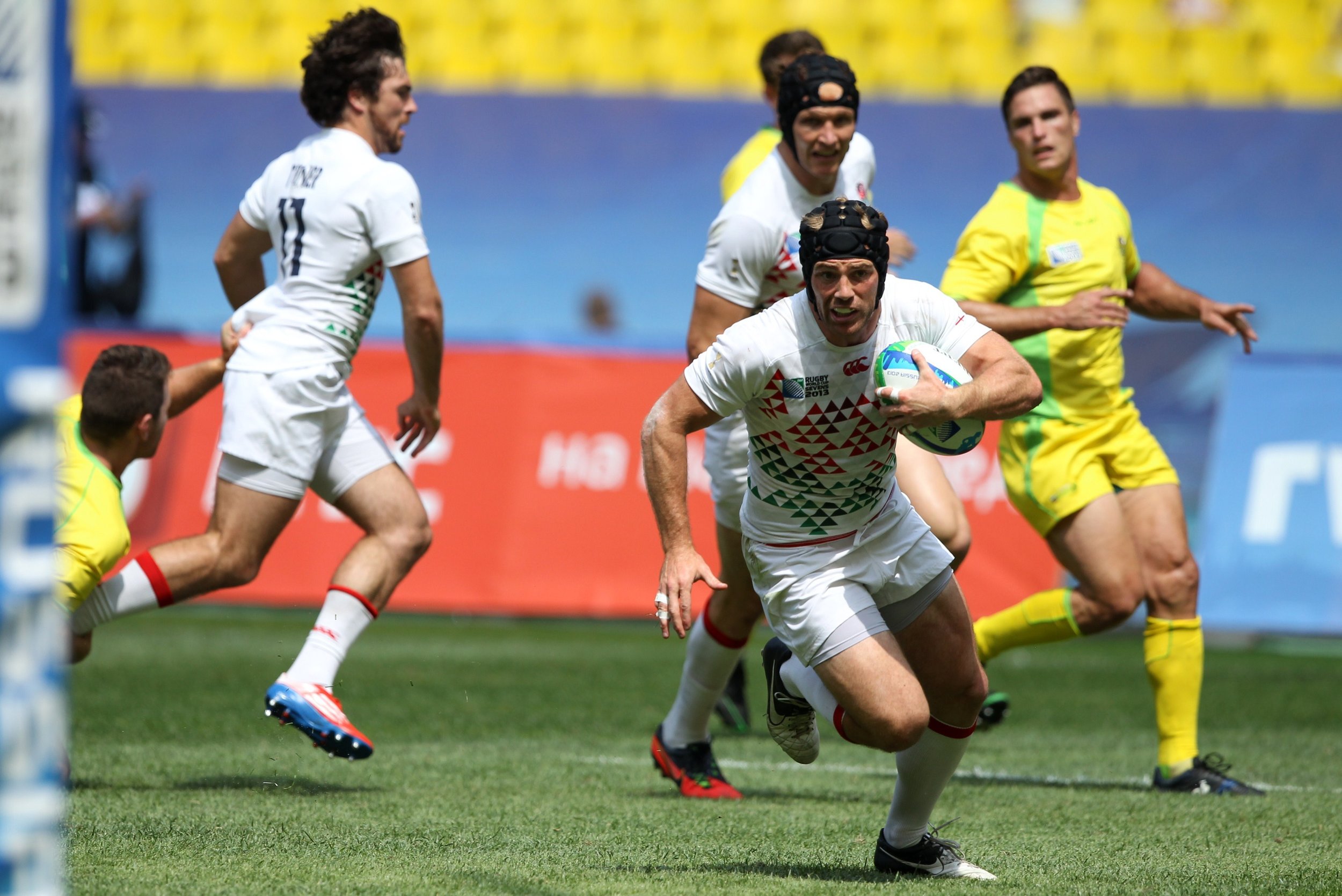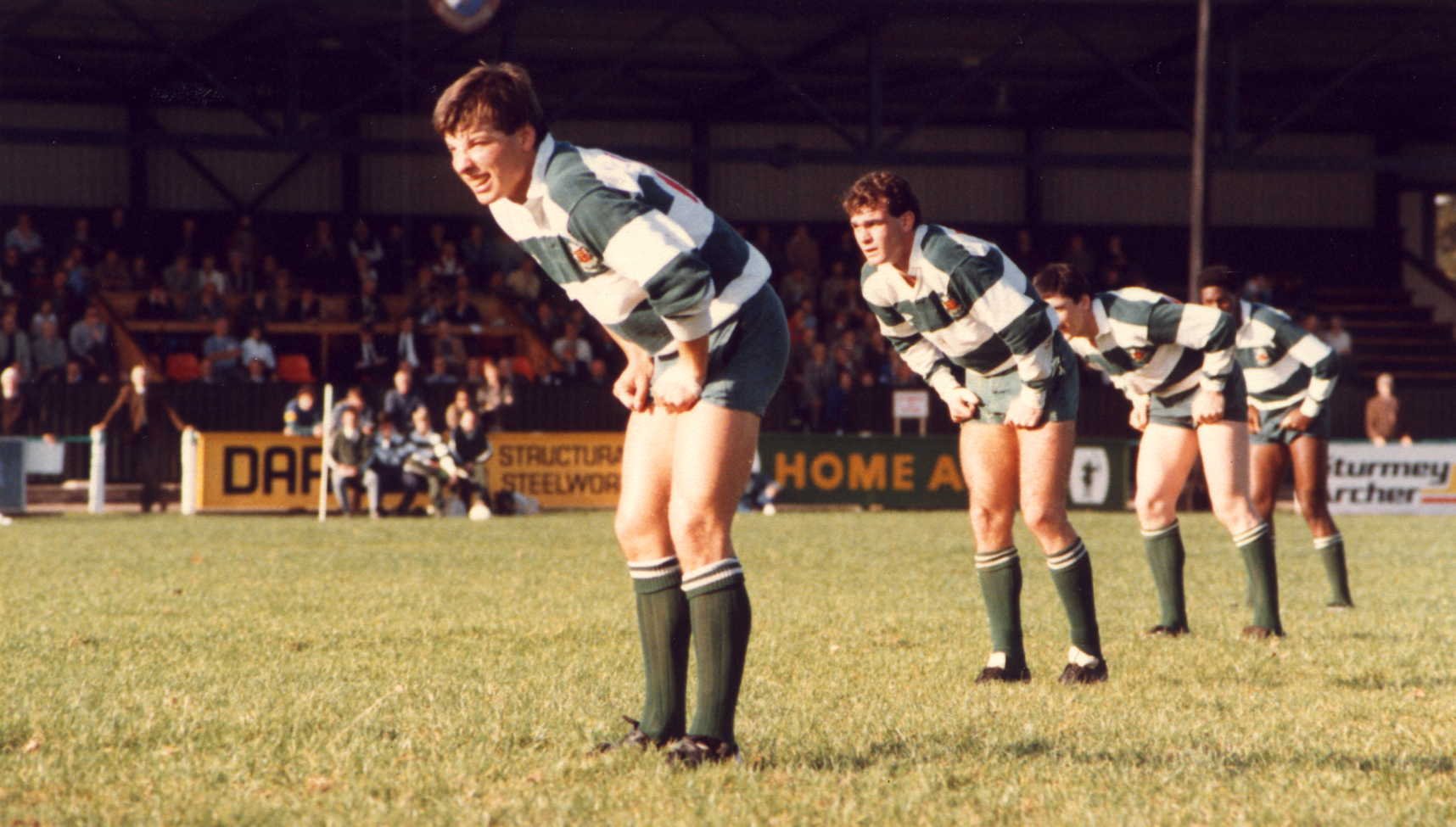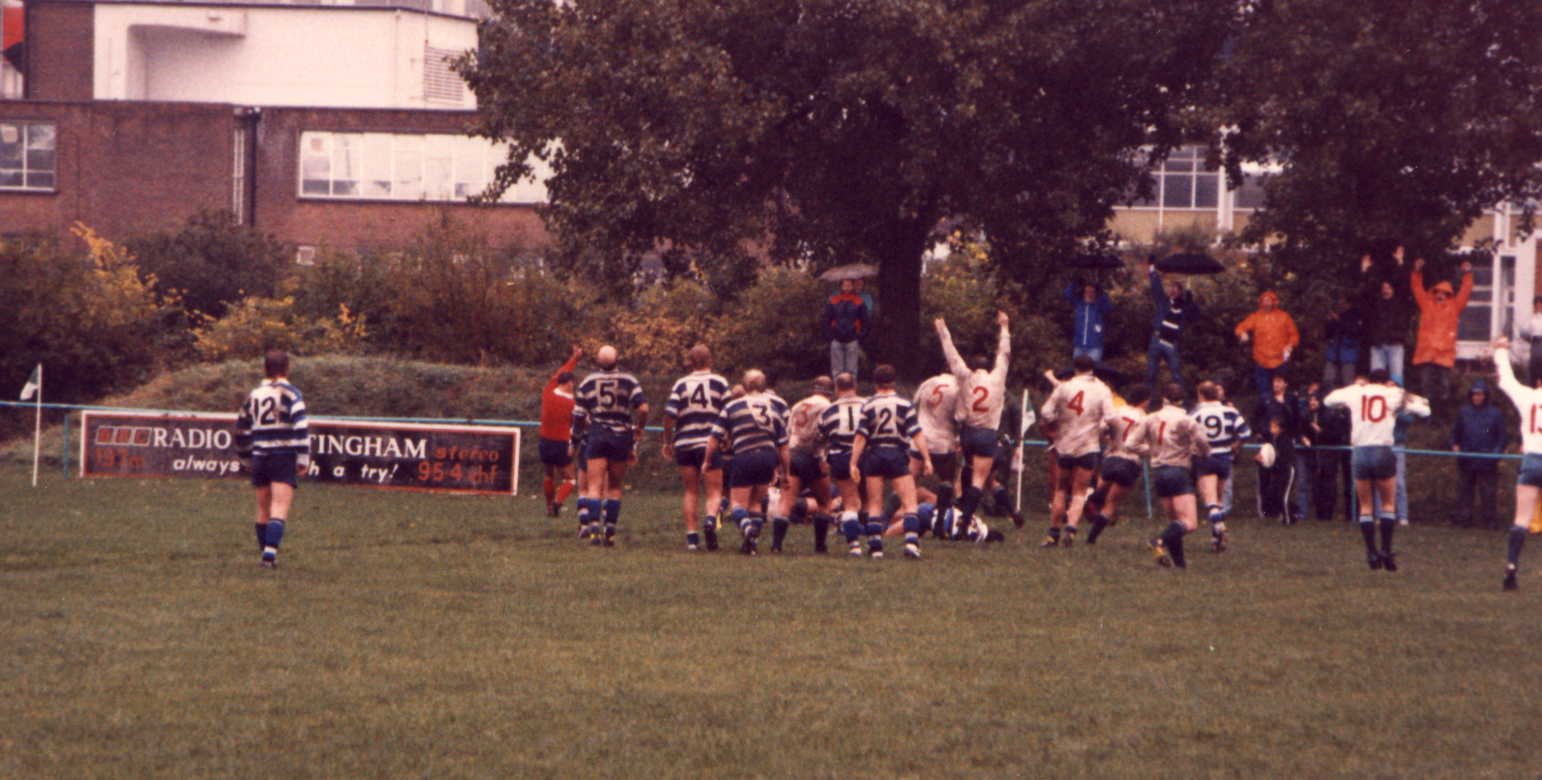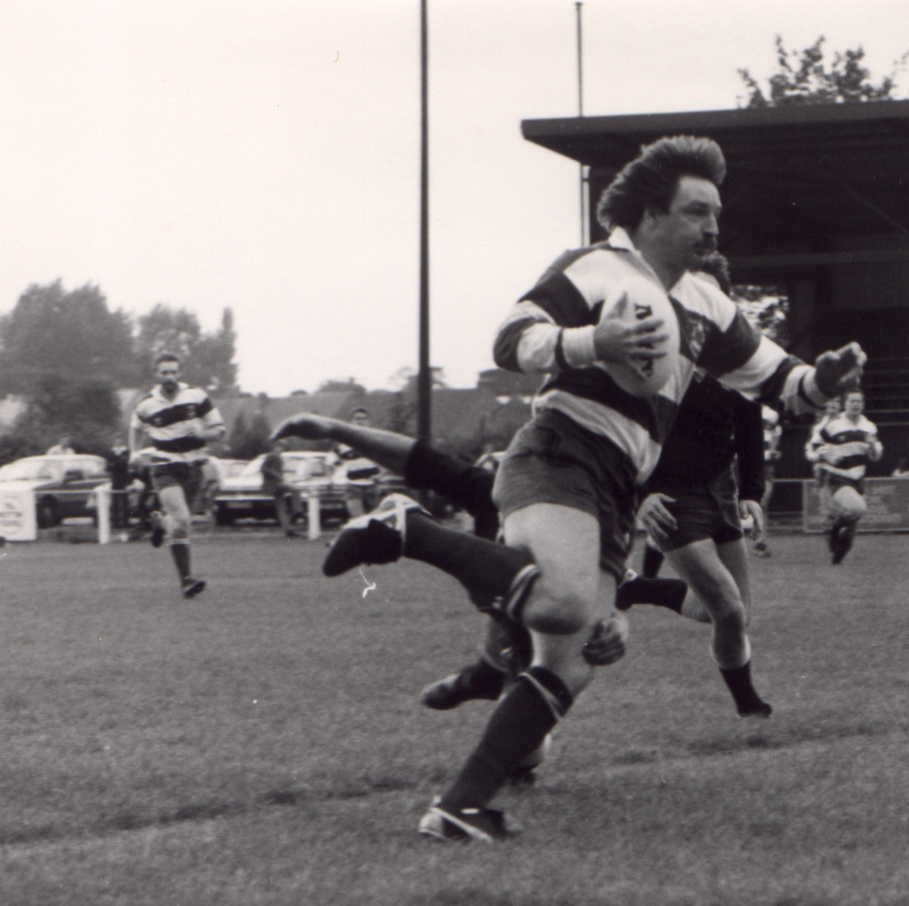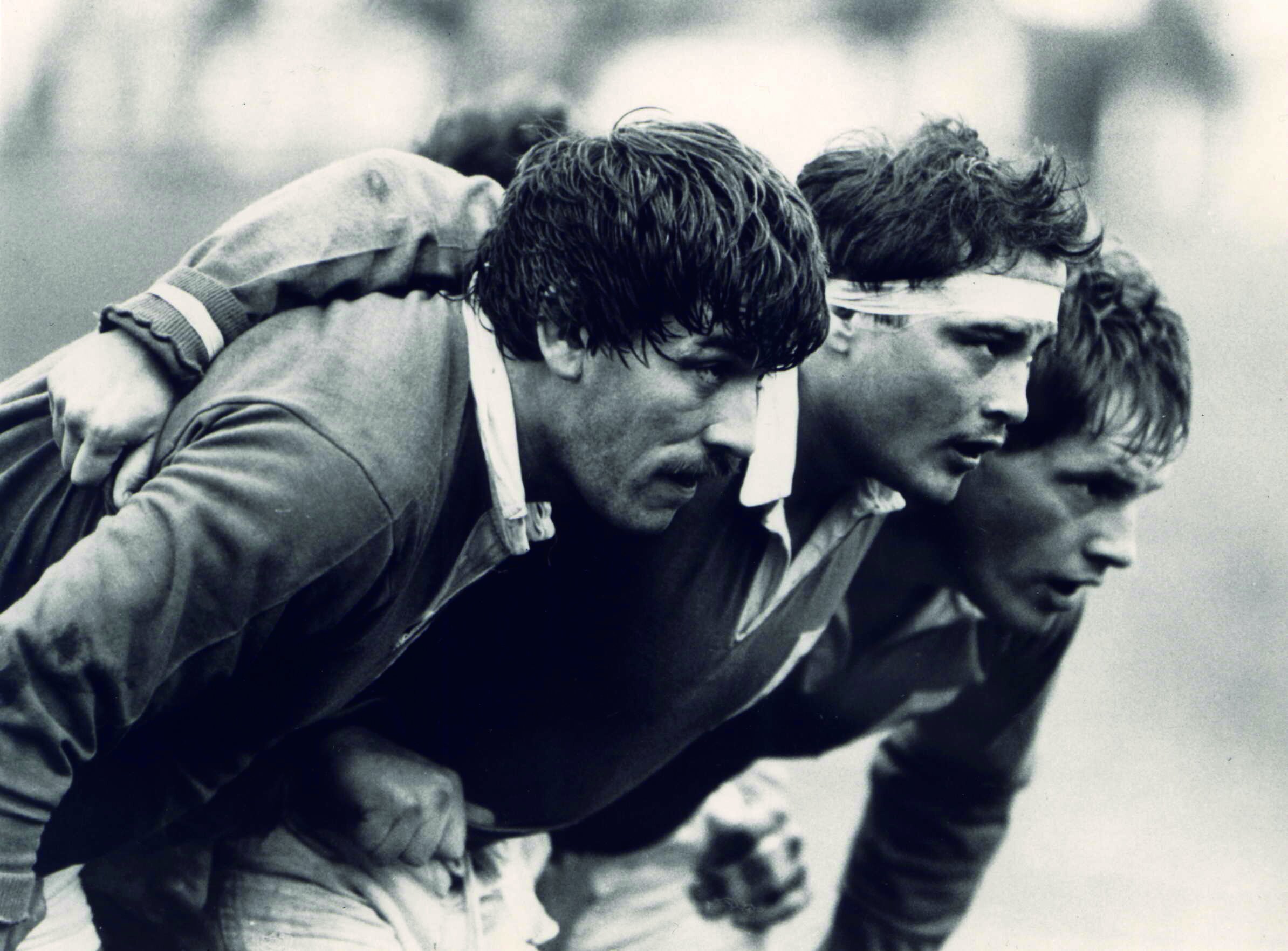
Rugby Lives Rob Vickerman
Rhino Sherpa Robe
Ireland Avenue
Adam Radwan
Bill Sweeney
From his first contract to polo shirts as currency, the former England Sevens captain and current commentator tells us about his rugby life, past, present, and future.
My parents met at the rugby club, so I had no choice really. The legend goes that I attended my first game when I was three days old. I was born on the Wednesday, and then mum had me down on the touchline, watching dad play on the Saturday for Westpark Bramhope. It was ingrained in me from a very early age.
I ended up playing against Jonah Lomu. I made my debut against Llanelli in the Power Gen, and from there I played fifteen games consecutively which included the Heineken Cup, as we’d won the Power Gen the previous year. In our pool we had Perpignan, Cardiff, and Calvisano. Lomu was playing for Cardiff. The guy was like a computer game, he transcended the game completely. I’ve got a picture at home of him running with the ball in hand and me just in a foetal position around his ankles.
When I first went to Twickenham, I took home some mud and grass from the pitch in a little egg cup. I kept it in my bedroom. I couldn’t even say Twickenham at the time, I think I used to call it ‘Twick’nham’. The game was against Australia, and we also took home one of the cushions off the seats.
The only time I remember watching a professional club game as a kid was at Newcastle. It was when the dream team was playing in the late 90s. I remember walking past Inga Tuigamala and thinking this giant of a man was superhuman. You could almost hear his legs thudding as he walked, and he stank of deep heat.
I had a science teacher ask me what my plans were for my career. I told him I’d love to pursue sports, and he said ‘yeah, but what do you really want to do?’ It was that opinion that riled me towards really trying to make it. I remember wanting to prove that it was doable, I had an attitude to succeed in a place where it wasn’t really considered something you could do.
The premise of professional rugby in Yorkshire wasn’t ever anything to do with rugby union. If you wanted to be a pro in Hull, you had to play league. But Stuart Lancaster had just started coaching my year group at Leeds, and he was an absolute forward thinker at the time. He set up an academy structure, and I was selected for one of them. I also managed to break into the England sevens team when I was 19.
My first professional contract was for about £3,000. The reality was it was an advanced student loan, just cash to get to training and to fuel yourself. There were four or five of us on it; Jordan Crane, Rob Webber, Danny Care was in the mix for it as well.
In the fifteenth consecutive game after my debut, I did my ACL. I went to sidestep, and something felt wrong, so I hit the deck. It was absolute agony. I went from the euphoria of playing consecutive games to watching on the side-line while I was rehabbing. Leeds got relegated, I was devastated. I managed to come back in September against Worcester, and I did the same thing again.
One of my dreams had always been to play England sevens again. I remember distinctly being handed my shirt and thinking all the way back to the rehab and the dark days. When you do achieve something you set out to do, it is pretty amazing. To this day, that 2008/2009 sevens series where I was doing both fifteens and sevens was the year of my career by an absolute mile.
I captained England sevens at the World Cup 20 years after they had won it in ’93. There was no one in the stadium because Putin had decided two weeks prior that they were going to can booze. We got hammered in the final. It’s good to say I captained England in a World Cup final, just not the result we wanted. You never remember second place, that’s the problem.
I’ve always been one of those nerds that keeps all their accreditations. I keep them in a little chest at home. Every once in a while, I have a look back through them to reflect. The highs of winning in Wellington are hard to beat. It was a difficult atmosphere. They would play the Coronation Street theme tune whenever we went out to train and there were only one or two fans in there with England shirts on, amongst the 35,000 kiwis in fancy dress.
We were very much hated, and we used that as momentum. We ended up three tries down at half time, and to this day I remember Ben Ryan’s team talk. He spoke about the balance between challenge and belief, and we went on to win the game.
England polo shirts were pretty hard currency. You could exchange them for whatever you want. A couple boys on the team ended up wearing dressing gowns, one or two were in women’s clothing. I went for a Duff Man outfit.
I had always loved to chat about rugby, and I ended up being a co-commentator at the Commonwealth Games in 2014. I love when you hear stories of perfect timing, and this was one of them. I had sent out fifteen or twenty emails to the BBC. There was one person who was in charge of the programme structure, and he emailed me back within five minutes and said, ‘what timing, we’ve just had a conversation about who we’re going to use for BBC five live- would you be available?’ Obviously, I threw myself at it.
You get the adrenaline of playing without getting your head kicked in. You get the buzz without the bruises. It transpired that in January of that season, I got an injury at London Scottish where someone clattered me going into a ruck, crushed my neck back into my shoulders. I went to see a physio and they said it was looking like they would have to operate. I didn’t want to do that. I had two kids under two, I need to be able to be a dad and not being able to pick them up for six months isn’t going to be that great.
The gamechanger for me was working on the Olympics. You go from talking about potentially millions of people listening and watching to 2.3 billion. You’ve got to get that so right, you don’t necessarily know that the people watching even know what a ruck is, or a tackle.
I die on the fact that you have to have the opinion and position of someone watching it. I never avoid anything, if things are controversial, like the interpretation of tackle height, you still have to talk about it. People watching often think it’s not a debate – it’s always a debate. There is always opinion, I’ve always got one and you may not agree with it, but I think it’s an important thing to have.
When you get an Austin Healey, who is articulate with his points and puts some across brilliantly, he’s often chastised for it. Do you want some sort of vanilla commentator who’s not going to give you their opinion, or do you want someone who can be erudite enough and expressive enough to put it across well?
I’ve got a new role within World Rugby. The title is Teams Marketing and Commercial Operations. I’m trying to create more opportunities for the players, the teams, and the unions within sevens. It still involves a bit of commentary, but the main aim is to make sevens that little bit more sustainable and improve the opportunity for players. I can’t wait to work with the likes of Fiji, Kenya, these people with brilliant stories, but not necessarily the most support.
This weekend’s winners chosen by Rob Vickerman
The Irish are looking red hot. Ireland beat Wales 12-23.
England will be too powerful upfront. England beat Scotland 18-15.
France versus Italy will be bonkers rugby. France beat Italy 32-23.
By Tyrone Bulger
WIN a Rhino Sherpa Robe
We’re giving away three Rhino’s Sherpa Robes. Designed with a fleece-lined body, hood and pockets for maximum warmth and comfort. The robe gives you the opportunity to change out of your wet and dirty sportwear while keeping yourself dry and warm.
To enter, visit our competition posts on Twitter, Facebook, Instagram.
Ghost Grounds #10
Ireland Avenue, Nottingham RFC, 1904-2004
Ireland Avenue was the home of Nottingham R.F.C. for more than a century. With some infamous fixtures throughout the decades, the ground was home to many elite level players, the likes of Brian Moore and Rob Andrew amongst their ranks.
The tale of how Nottingham RFC came to call Beeston home begins with the Birkin family. Alexander, or Alick, Birkin, founded the club in 1877, when he returned from school in Rugby. He managed to cobble together a team of friends and the earliest match reports in local papers date back to 1885. At the time, the club played on a field behind the White Hart Inn, Lenton.
In 1904, the ground at Beeston was purchased by Alick’s brother, Leslie, for a fee of £25 a year plus £5 to the farmer who used the field to graze his sheep. Leslie then gifted the field to the rugby club to serve as a permanent home. It was then known as Rylands Road but became Ireland Avenue in 1947.
Situated to the south-west of Nottingham’s city centre, Beeston is a small village that has always had a high concentration of pubs, a perfect place for a local rugby team to lay its roots. One of those pubs is the Victoria Inn, only a few hundred metres from the ground. In the first four years spent at Ireland Avenue, Nottingham had the privilege of using the upper floor of the pub as changing facilities. This only lasted five years however, and in 1909 the club were banished to the stables for ‘misbehaviour’, where a single domestic bathtub had to serve both home and away teams.
Despite the lack of facilities at Ireland Avenue, it soon gained a reputation as a fearsome place for travelling sides to visit. The first match was played against an ‘Old Crocks’ XV and early clashes with the likes of Leicester, Old Edwardians and Moseley in the Midlands County Cup saw Nottingham finish as runners up in 1905 and winners the following year.
In 1909, the first stand was built, for the sum of £800, once again paid by Leslie Birkin, a wooden grandstand that provided shelter for a few hundred people. At some point though, most likely during the First World War, part of it was lost to a fire. The war was a major setback for all clubs in the country, and it was not until 1929 that further developments took place, and the first changing rooms were built.
During the 1920s, Nottingham began to find success on the pitch assisted by the try-scoring exploits of a player named Arthur Derry. Either side of the Second World War the club continued to show great promise.
The ground has seen several clubhouses built throughout the years, the earliest of which was ‘The Shack’, an old tennis pavilion, followed by ‘the Hut’, which was previously the groundsman’s shed. In 1955, the first original clubhouse was built, followed by the replacement of the old changing rooms in 1964.
Two years later, Nottingham became the first English club to officially appoint a head coach with David ‘Dai’ Youngs taking the reins. He developed a pack that was a force to be reckoned with, and the club began to compete with some of the country’s powerhouses.
Another clubhouse was added to the site in 1977 to commemorate the club’s centenary year. By this time, Nottingham had established themselves as one of the premier sides in the Midlands and were about to enter their golden era. In the 1980s and 90s, the likes of Brian Moore, Rob Andrew, Neil Back and Simon Hodgkinson added a star-factor to the team, and between 1984 and 1991, they reached two National Knockout Cup semi-finals, three quarter-finals, and finished second in the inaugural season of the National Merit Tabla A.
The ground at Ireland Avenue underwent one of its most significant developments in the 80s. Due to its proximity to the river Trent, making up part of the low-lying flood meadows, the pitch was known as somewhat of a mud heap for all of 75 years. It was a great relief when the club committed £25000 to solving the issue of the ground’s drainage.
Despite their relative successes throughout the 80s and 90s, the dawn of professionalism presented fresh challenges. The new Courage League season did not go well for the club, who managed only two wins, both at Ireland Avenue, and were subsequently relegated into National Division Two. There was no immediate bounce back for the side, but they continued in their endeavours to keep up with the transition to a more professional game.
This move to full-time rugby meant a move away from their beloved Ireland Avenue. In 2004, after 104 years at that ground in Beeston, Nottingham sold the land to housing developers and made their move to Lady Bay in 2006.
While the club were forced to move on, Ireland Avenue will remain the first true home of rugby in Nottingham and fond memories will be held of the old guard that had the pleasure of playing on that veritable mud heap.
By Tyrone Bulger


